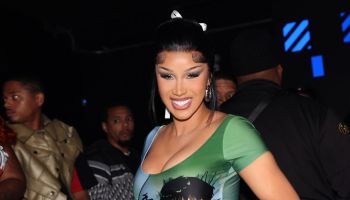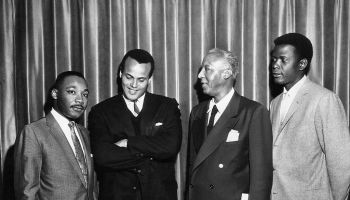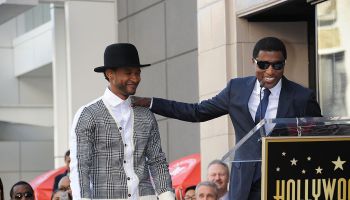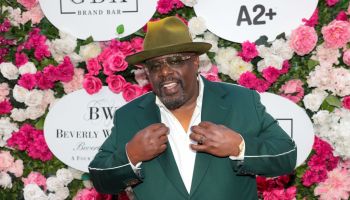Canadian actor/model Taylor Kitsch put his hunky muscles aside for his serious role in the based on a true story movie “The Bang Bang Club.” Taylor plays Kevin Carter, a passionate photo journalist in the middle of a civil war in pre-apartheid South Africa.
Taylor dropped 30 lbs of muscle to portray Kevin accurately. GlobalGrind headed to the Tribeca Film Festival to speak with Taylor about the trials and tribulations of his role as Kevin Carter. He’s also joined by amazing actors Ryan Phillippe and Malin Akerman.
Taylor discussed the difficulty of capturing a complex character such as Kevin, who eventually committed suicide by carbon monoxide poisoining in 1994.
Check out the exclusive interview below!
GlobalGrind: What attracted you to the movie in the first place?
Taylor Kitsch: What didn’t, really? On a personal level I think if you can pull something like this off, you’re going grow as an actor and as a person and just a challenge. It’s a dream role really as much as it is a tax on you mentally and physically. It’s a true story. The stakes were just so high so there’s so much for me to dive into and as an actor, it’s incredible.
The director said it was incredible how many photos you took. Are you going to put up the photos on a website or publish them or keep them to yourself?
Yeah, I definitely got caught up in it all … I don’t think I’m that good yet to be honest with you. There’s a scene where the guy throws a Molotov cocktail at one of the trucks and I was taking real photos there, so I blew those up and I have them on my wall with a recreated cover of the book. It’s pretty cool.
How would you describe the people of South Africa?
Love. Great energy.
[pagebreak]
Can you all talk about shooting in South Africa and getting the accents down?
Loved it, loved it. I don’t think you can shoot anywhere else, it’s another character in this film. We’re in the township of Soweto. We’re truly recreating these scenes that happened right there, near or on the killing field and if you can’t put yourself in the moment, you’ve really got some more work to do.
Was this the first time you lost that much weight for a role?
Absolutely.
Why did you want to do it and what was your thought process?
To be honest to Kev and do it right. I don’t think you can really relate to him if I’m all jacked and (Tim) Riggins (his character in “Friday Night Lights)-like. I even showed Greg Marinovich. He was like ‘How did they hire you?’ I was a lot bigger when I got the role. I had to convince (Steve, the director) Silver. Silver was in South Africa as well when I was prepping and we would Skype and I’d be losing all this weight and he kept saying, ‘Just stop, no one asked you to do this’ but I said no. There was a line I wanted to get for Kev as well. I had a picture up of where I wanted him, so it was strong motivation.
Now that you’ve played a photo journalist in a war how do you feel about the photo journalists who died in Libya?
I think it’s a great time for this film. It just makes it that much more relevant. I think any attention you can bring to these cats and what they sacrifice is good.
[pagebreak]
What did you come away learning about what they go through?
A lot. Obviously Kev sacrificed the ultimate thing. It really just grounds you. I think we can all take it for granted what these guys do out there and what they put out every day. For me personally, it was a wake up call that we can all be quite selfish sometimes and not notice what these guys are putting out.
With Kevin not around, did you talk to Greg (Marinovich, photographer) on the set?
I met Greg that day, which was a huge day for me obviously and I hadn’t met Ryan (Phillippe) yet. The funny thing is I’m talking like this on set watching Ryan the first day and he’s like ‘Where’s your accent?’ And I’m like ‘I’m not playing Kev yet.’ The one question I asked both of them was five attributes you would give Kev if you could just explain the guy in five words or less and one of them couldn’t get to the fifth word, so that says a lot about how close it still was to them. It just raises your game to play him right.
[pagebreak]
A big issue in the film is whether or not these guys should have helped a single individual as opposed to capturing the photo that then ended up helping so many more people. Where do you guys fall on that debate? What is more important: helping the individual or capturing a moment to help more people?
The camera is really their gun. It’s really their way of making a difference too. Everyone has their own moral integrity of where they stand and every situation is different. What’s funny though is even now with modern day news, you turn on any channel tonight and it’s gonna be negative. You don’t hear about the journalists that rescued someone or who caught something or did something to prevent something worse from happening. But there’s also a fine line. Like Malin (Akerman) said, if I’m there trying to do everyone else’s job you’re actually endangering people and impeding the process. Knowing where you stand takes a lot more courage than to be chaotic. It’s an endless debate.
You’ve seen the completed film. When you see it does it recreate some of the experiences for you? Do you feel like you were ultimately effective in what you were trying to do in the film and in expressing the message of it?
To be able to walk away and tell someone a story and especially what Kev went through and show a full spectrum, I feel personally I’ve done literally everything I physically and mentally could do so I could let go.
[pagebreak]
Canadian model/actor Taylor Kitsch.
[pagebreak]
Canadian model/actor Taylor Kitsch.
[pagebreak]
Canadian model/actor Taylor Kitsch as Kevin Carter in the movie “The Bang Bang Club.”
















